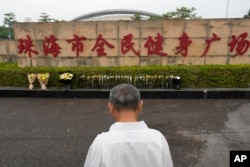China's economic malaise is fueling social tensions that make people more likely to commit violent crimes out of anger or desperation, analysts say, after the country witnessed its deadliest massacre in a decade.
The country has experienced a spate of violent attacks this year, challenging Beijing's proud reputation for public order and prompting online soul-searching about the state of society.
On Monday, a man plowed a car into crowds at a sports complex in the southern city of Zhuhai, killing 35 and wounding 43, according to official figures.
It followed a string of similar crimes as China struggles to revive economic growth, keep people employed and boost confidence since it ended rigid COVID curbs in late 2022.
"The recent spate of violent attacks in China is a reflection of its worsening social and macroeconomic conditions," said Hanzhang Liu, an assistant professor of political studies at Pitzer College in the United States.
"Although these incidents are sporadic in nature, the increasing frequency at which they happen does suggest that more people in China are suffering from hardships and desperation that they have not previously experienced," she told AFP.
Signs of economic distress have multiplied in China in recent years, from capital flight and emigration to rising joblessness, anger at expensive housing and childcare, and youth cultures glorifying low expectations and rejecting the rat race.
Lynette Ong, distinguished professor of Chinese politics at Canada's University of Toronto and senior fellow at the Asia Society, said violent attacks were the "negative side of the same coin."
"These are symptoms of a society with a lot of pent-up grievances," Ong told AFP. "Some people resort to giving up. Others, if they're angry, want to take revenge."
The problem was "very new to China," she said, adding that the country may be tipping "towards a different type of society, an uglier society."
New threats
Police said initial enquiries showed the perpetrator of Monday's rampage was a 62-year-old man "dissatisfied" with a divorce settlement.
In other cases, a middle-aged man used a knife and firearm to kill at least 21 people in eastern Shandong province in February, and a 55-year-old man rammed a car into a crowd in the central city of Changsha in July, killing eight, following a property dispute.
A 50-year-old man wounded five in a knife attack at a school in Beijing last month; a 37-year-old man fatally stabbed three and injured 15 in a Shanghai supermarket in September; and a 44-year-old unemployed man fatally knifed a Japanese schoolboy in Shenzhen the same month.
In some cases, the motives remain unclear or undisclosed, while scant media coverage and widespread online censorship have hampered understanding of the problem's potential social roots.
But the attacks have revealed the limits of a nationwide system of surveillance cameras and data-driven policing that roots out public security threats.
Suzanne Scoggins, an associate professor of political science at Clark University in the United States, said the recent attacks showed that "there is no such thing as an all-seeing, all-knowing police state."
Minxin Pei, a professor at California's Claremont McKenna College, told AFP that "the system is very good at watching known threats, but it does a poor job dealing with previously unknown or unidentified threats."
"The man who killed so many people in Zhuhai most probably was not known as a threat to the police," said Pei, who also authored The Sentinel State, a book on surveillance in China.
Secrecy, strain
President Xi Jinping called on officials to prevent "extreme cases" after Monday's attack, while Beijing's foreign ministry repeated that the country is "one of the safest" in the world.
China's official murder rate last year was 0.46 cases per 100,000 people, compared to 5.7 in the United States.
Still, authorities swiftly extinguished commemorations of the Zhuhai incident, clearing public memorials to victims and quashing online discussion.
Analysts said the censorship was a reflexive state response to deter copycat violence and prevent official embarrassment.
"The Chinese state's default modus operandi is secrecy," said Steve Tsang, director of the SOAS China Institute in London.
Liu, of Pitzer College, called the violence a "thorny challenge" to Beijing as it addresses the economic slowdown.
China typically responds to social instability by bolstering public security and surveillance systems, she told AFP.
But with the government facing "unprecedented fiscal woes," this would only put more pressure on drained public coffers, Liu said.















